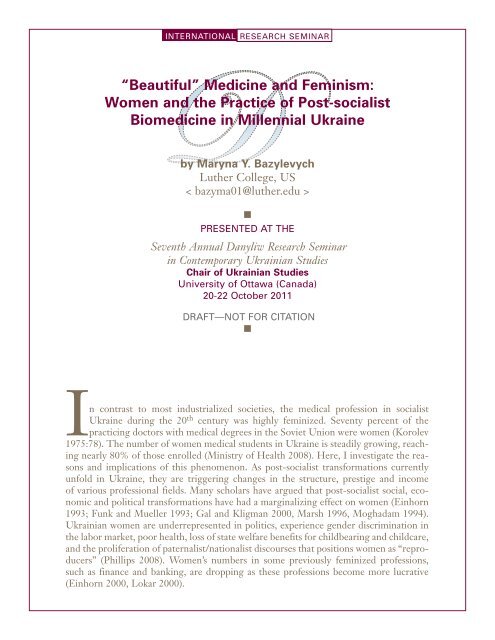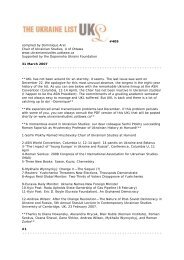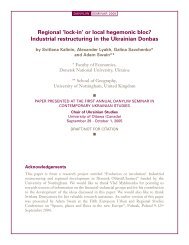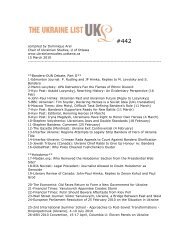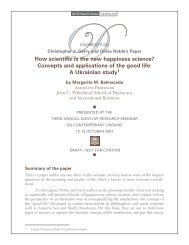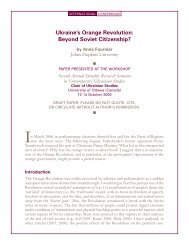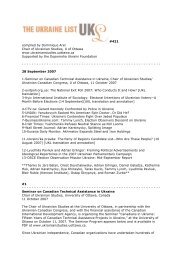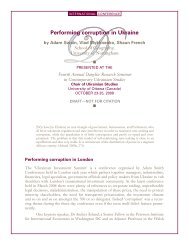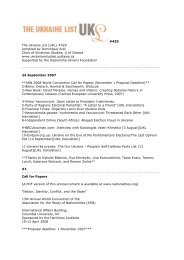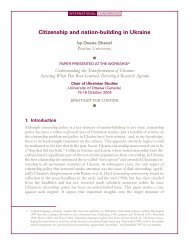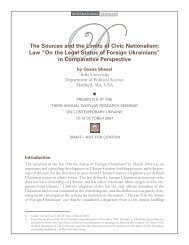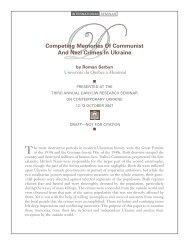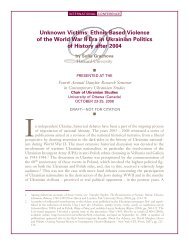âBeautifulâ Medicine and Feminism - Chair of Ukrainian Studies
âBeautifulâ Medicine and Feminism - Chair of Ukrainian Studies
âBeautifulâ Medicine and Feminism - Chair of Ukrainian Studies
You also want an ePaper? Increase the reach of your titles
YUMPU automatically turns print PDFs into web optimized ePapers that Google loves.
international RESEARCH SEMINAR<br />
“Beautiful” <strong>Medicine</strong> <strong>and</strong> <strong>Feminism</strong>:<br />
Women <strong>and</strong> the Practice <strong>of</strong> Post-socialist<br />
Biomedicine in Millennial Ukraine<br />
by Maryna Y. Bazylevych<br />
Luther College, US<br />
< bazyma01@luther.edu ><br />
■<br />
presented at the<br />
Seventh Annual Danyliw Research Seminar<br />
in Contemporary <strong>Ukrainian</strong> <strong>Studies</strong><br />
<strong>Chair</strong> <strong>of</strong> <strong>Ukrainian</strong> <strong>Studies</strong><br />
University <strong>of</strong> Ottawa (Canada)<br />
20-22 October 2011<br />
DRAFT—NOT FOR CITATION<br />
■<br />
In contrast to most industrialized societies, the medical pr<strong>of</strong>ession in socialist<br />
Ukraine during the 20 th century was highly feminized. Seventy percent <strong>of</strong> the<br />
practicing doctors with medical degrees in the Soviet Union were women (Korolev<br />
1975:78). The number <strong>of</strong> women medical students in Ukraine is steadily growing, reaching<br />
nearly 80% <strong>of</strong> those enrolled (Ministry <strong>of</strong> Health 2008). Here, I investigate the reasons<br />
<strong>and</strong> implications <strong>of</strong> this phenomenon. As post-socialist transformations currently<br />
unfold in Ukraine, they are triggering changes in the structure, prestige <strong>and</strong> income<br />
<strong>of</strong> various pr<strong>of</strong>essional fields. Many scholars have argued that post-socialist social, economic<br />
<strong>and</strong> political transformations have had a marginalizing effect on women (Einhorn<br />
1993; Funk <strong>and</strong> Mueller 1993; Gal <strong>and</strong> Kligman 2000, Marsh 1996, Moghadam 1994).<br />
<strong>Ukrainian</strong> women are underrepresented in politics, experience gender discrimination in<br />
the labor market, poor health, loss <strong>of</strong> state welfare benefits for childbearing <strong>and</strong> childcare,<br />
<strong>and</strong> the proliferation <strong>of</strong> paternalist/nationalist discourses that positions women as “reproducers”<br />
(Phillips 2008). Women’s numbers in some previously feminized pr<strong>of</strong>essions,<br />
such as finance <strong>and</strong> banking, are dropping as these pr<strong>of</strong>essions become more lucrative<br />
(Einhorn 2000, Lokar 2000).
international RESEARCH SEMINAR<br />
Yet, new ethnographic evidence supports the idea that women’s experiences <strong>of</strong><br />
post-socialist transformations have not been universally negative or disadvantaging, <strong>and</strong><br />
that many <strong>of</strong> them were able to benefit from these changes (Fedyuk 2009, Phillips 2008).<br />
Ghodsee (2005), for instance, argues for more in-depth research while paying attention<br />
to the macro-level economic processes that enable or disable certain trends in women’s<br />
lives. She echoes Mohanty’s (1986) dissatisfaction with the term “oppression” that tends<br />
to over-generalize women’s struggles across classes <strong>and</strong> cultures. By looking at women<br />
only through the lens <strong>of</strong> their losses, or oppression, scholars homogenize their experiences<br />
or create binary analytical categories: oppressors (states, patriarchy) <strong>and</strong> oppressed.<br />
Similarly, power is understood in a binary way: source <strong>of</strong> power <strong>and</strong> reaction to power. As<br />
the third-wave feminists (Abu-Lughod 1993, Behar 1993, Butler 1993, Lamphere et al.<br />
1997, Narayan 1993, Rosaldo 1980) have argued, defining power in terms <strong>of</strong> possessing<br />
it versus being powerless does not fully capture women’s experiences across the world.<br />
Different women possess different degrees <strong>of</strong> power, <strong>and</strong> their class, ethnicity, health<br />
status, <strong>and</strong> other factors create different degrees <strong>of</strong> privilege <strong>and</strong> oppression. Following<br />
this logic, I explore whether the increasing number <strong>of</strong> women in post-socialist medicine<br />
is the result <strong>of</strong> the increasing empowerment <strong>of</strong> <strong>Ukrainian</strong> women, or <strong>of</strong> women being<br />
pushed out <strong>of</strong> more lucrative jobs (in the finance <strong>and</strong> banking sectors), or <strong>of</strong> interrelations<br />
between local gender constructions <strong>and</strong> economic transformations, or <strong>of</strong> a complex<br />
interplay among all <strong>of</strong> these factors. What does it mean to be a physician in post-socialist<br />
society today, <strong>and</strong> what makes women more likely c<strong>and</strong>idates for the job? What types <strong>of</strong><br />
skills does current medical work require <strong>and</strong> why are mainly women drawn to this new<br />
content?<br />
I argue that some <strong>of</strong> the reasons so many women choose the medical pr<strong>of</strong>ession<br />
are related to their choice <strong>of</strong> <strong>and</strong> culturally embedded beliefs about particular specialties,<br />
which in turn manifest in a particular non-Western version <strong>of</strong> feminism. This paper<br />
describes how gendered concepts <strong>of</strong> beauty, cleanliness, motherhood, <strong>and</strong> erudition<br />
structure the practice <strong>of</strong> medicine in Ukraine. Ideas <strong>of</strong> “beautiful” <strong>and</strong> “clean” work serve<br />
as one <strong>of</strong> the ways in which women are inserted into post-socialist circulations <strong>of</strong> ideology<br />
<strong>and</strong> capital. Women physicians perform culturally appropriate healing work guided<br />
by familial associations, <strong>and</strong> in so doing reinforce their moral <strong>and</strong> cultural authority. In<br />
addition, women are exp<strong>and</strong>ing their pr<strong>of</strong>essional repertoires by claiming new lucrative<br />
biomedical fields. They employ new competing gender discourses <strong>and</strong> become agents <strong>of</strong><br />
change in the biomedical pr<strong>of</strong>ession in Ukraine.<br />
Paying attention to the micro- <strong>and</strong> macropolitics <strong>of</strong> women’s involvement in the<br />
biomedical field provides crucial knowledge about power <strong>and</strong> disadvantage within the<br />
newly forming capitalist system. At the same time, I suggest that changes in the biomedical<br />
sphere associated with new market ideas have been at least in part empowering<br />
for women pr<strong>of</strong>essionals. This work will employ Mohanty’s (2002) feminist solidarity<br />
model. Its main premise is that local <strong>and</strong> global constitute each other <strong>and</strong> that all communities<br />
have interweaving histories. The collapse <strong>of</strong> the Soviet Union is <strong>of</strong>ten taken as<br />
2
international RESEARCH SEMINAR<br />
a reason to discredit all rationalities <strong>and</strong> knowledge produced by it, which makes it easy<br />
for Eurocentric universalizing ideologies to occupy the post-socialist territory. Instead<br />
<strong>of</strong> applying feminist rationalities that do not always encompass local underst<strong>and</strong>ings <strong>of</strong><br />
gender, feminist solidarity model allows us to focus on the “micropolitics <strong>of</strong> context, subjectivity,<br />
<strong>and</strong> struggle” <strong>and</strong> the “macropolitics <strong>of</strong> global economic <strong>and</strong> political systems<br />
<strong>and</strong> processes.”<br />
My research explores how female mobility in the biomedical field complicates<br />
conceptualization <strong>of</strong> women as losers in post-socialist transformations. The gendered<br />
biomedical work manifests itself in a particular non-Western version <strong>of</strong> feminism where<br />
women emphasize their social position <strong>and</strong> connections within the pr<strong>of</strong>ession as some <strong>of</strong><br />
the most salient factors shaping their careers, which supports argument for intersectionality<br />
in gender analysis.<br />
Research setting<br />
This research is based on ethnographic fieldwork data collected in the central <strong>and</strong> western<br />
parts <strong>of</strong> Ukraine in 2007-2008. This project took place in central Ukraine with a<br />
focus on Kyiv, its capital city <strong>and</strong> the smaller city <strong>of</strong> Vinnytsia in a remoter part <strong>of</strong> central<br />
Ukraine.<br />
Today, Ukraine continues to use the state-sponsored <strong>and</strong> centralized Soviet health<br />
care model m<strong>and</strong>ated by the Ministry <strong>of</strong> Health. The Constitution <strong>of</strong> Ukraine appoints<br />
legal responsibility for ensuring free <strong>and</strong> universally accessible health care to the state.<br />
The country’s socioeconomic crisis has created environment when health problems<br />
flourish. In the context <strong>of</strong> skyrocketing prices on pharmaceuticals, medical supplies,<br />
equipment, <strong>and</strong> energy a costs, “free” <strong>and</strong> “accessible” health care is essentially substituted<br />
by the informal fee-for-service system.<br />
It is estimated that over 50% <strong>of</strong> all health care financing originates from un<strong>of</strong>ficial<br />
<strong>and</strong> quasi-formal payments. Because health care is sponsored by the state, it is especially<br />
influenced by political instability permeating the country. In the past five years, at least<br />
four Ministers <strong>of</strong> Health tried their h<strong>and</strong> at running the biomedical field. None <strong>of</strong> them<br />
made much headway (Bobrov 2006). Yet, I reconsider the assumption that the medical<br />
pr<strong>of</strong>ession in post-socialist societies does not <strong>of</strong>fer a feasible avenue for good income<br />
<strong>and</strong> does not carry high prestige. The neo-Marxist perspective <strong>of</strong> medical work (Navarro<br />
1977, Reskin & Roos 1990) argues that women enter the medical pr<strong>of</strong>ession during<br />
times <strong>of</strong> economic instability when male competition decreases, in other words, as it<br />
becomes less lucrative to be a physician. In the former Soviet Union, women started to<br />
enter the medical pr<strong>of</strong>ession in increasing numbers in the 1930s (Field 1957), as a part <strong>of</strong><br />
the proletarianization <strong>of</strong> the pr<strong>of</strong>ession <strong>and</strong> the socialist ideology that celebrated female<br />
emancipation <strong>and</strong> required every citizen to participate in social production (Watson<br />
1994). According to Riska (2001), women entered the field as labor resources to assist<br />
3
international RESEARCH SEMINAR<br />
the industrialization <strong>and</strong> collectivization projects. Men were more drawn to heavy industry,<br />
which was prioritized by the Stalinist government. While these authors explain the<br />
economic factors in place, they leave out culturally embedded local processes that may<br />
have influenced women’s entrance into the biomedical pr<strong>of</strong>ession. A quick look further<br />
in history shows that women’s numbers among physicians grew in Ukraine even prior to<br />
socialist revolution (Renner 2008). My research turns to narratives <strong>of</strong> <strong>Ukrainian</strong> women<br />
physicians to tease out not only the economic factors that are affecting their entering the<br />
pr<strong>of</strong>ession in increasing numbers, but also builds on a critical interpretive perspective<br />
(Cassell 2000, Rivkin-Fish 2005) to provide a more culturally embedded underst<strong>and</strong>ing<br />
<strong>of</strong> the processes involved in a woman’s decision to practice medicine.<br />
My ethnographic fieldwork in central <strong>and</strong> Western Ukraine (2007-2008, 2004),<br />
suggests that men <strong>and</strong> women regard the medical pr<strong>of</strong>ession as a desirable career choice<br />
<strong>and</strong> as one <strong>of</strong> few stable pr<strong>of</strong>essions in the extremely unstable post-socialist world. While<br />
the <strong>of</strong>ficial wages <strong>of</strong> <strong>Ukrainian</strong> physicians are not high, they <strong>of</strong>ten represent a fraction<br />
<strong>of</strong> their un<strong>of</strong>ficial income, which also include patients’ informal payments, cooperation<br />
with pharmaceutical companies <strong>and</strong> work in new private health care facilities <strong>and</strong> labs.<br />
These informal earnings cannot be considered merely a supplementary “tip,” for they<br />
<strong>of</strong>ten constitute the bulk <strong>of</strong> physicians’ actual incomes (Kornai & Eggleston 2001). My<br />
research has shown that the medical pr<strong>of</strong>ession can be quite lucrative in relation to local<br />
economic st<strong>and</strong>ards.<br />
I now turn to analysis <strong>of</strong> my ethnographic evidence to introduce different narratives<br />
that women <strong>and</strong> men physicians employ to explain their gendered motivations <strong>and</strong><br />
experiences <strong>of</strong> practicing biomedicine.<br />
Essentializing gender difference<br />
Slava is a female neurologist in her early 30s who works in one <strong>of</strong> the largest city hospitals.<br />
She works night shifts in an urgent care unit, which makes her schedule flexible<br />
enough to squeeze in a second job in a private doctor’s <strong>of</strong>fice. Her boss at the second job<br />
hired her to work in a private <strong>of</strong>fice that he opened, specializing in vascular ultrasound<br />
diagnostics. After several years <strong>of</strong> working two jobs <strong>and</strong> with the help <strong>of</strong> her parents’<br />
investment, Slava quit her second job <strong>and</strong> purchased her own diagnostic equipment. She<br />
rented out a small <strong>of</strong>fice space <strong>and</strong> took her clients with her. She is very protective <strong>of</strong><br />
her knowledge <strong>and</strong> does not want to train any assistants for fear <strong>of</strong> competition. Slava<br />
has never been married, she is very sociable, she likes to go out <strong>and</strong> meet new people.<br />
She also dreams about having a family. She wants a husb<strong>and</strong> <strong>and</strong> a child. She has not met<br />
the right person just yet, explaining that <strong>Ukrainian</strong> men have become “defective” or too<br />
weak, a concept that I will return to later in this chapter,<br />
In a man I am looking for the qualities that have been important for centuries… A man<br />
must provide for the family: provide for them financially <strong>and</strong> emotionally. In general, a<br />
man must be a hunter (a provider). Today, well, men are not like that. They are a little<br />
defective. The good men who want to make money will be able to find ways. It depends on<br />
4
international RESEARCH SEMINAR<br />
the character. There are plenty <strong>of</strong> young doctors making great incomes because they want<br />
to, they are not afraid to work two or even more jobs. The rest are just lazy, they do not try.<br />
What Slava illustrates is one <strong>of</strong> the salient themes running through my respondents’<br />
narratives – their seeming essentializing <strong>of</strong> gender differences. The traditionalist<br />
view <strong>of</strong> a man as first <strong>and</strong> foremost a breadwinner (“a hunter,” in Slava’s words), superficially,<br />
tends to prevail among physicians, paralleling popular views in <strong>Ukrainian</strong> society<br />
as a whole. For women, it appears to be less problematic when their (women’s) desired<br />
income does not immediately translate into real earnings, since the primary role <strong>of</strong> a<br />
woman is <strong>of</strong>ten seen as being a mother <strong>and</strong> a protector <strong>of</strong> the home hearth. These essentialist<br />
views can be considered part <strong>of</strong> a nationalist revival (Rubchak 1996, Pavlychko<br />
1996), <strong>and</strong> also a continuity with the pre-socialist division <strong>of</strong> labor at home where women<br />
carried out most household tasks, which socialist egalitarianism project was not able to<br />
fully deconstruct (Einhorn 1993). While both female <strong>and</strong> male physicians desire wellpaid<br />
jobs, most <strong>of</strong> them share the view that it is much more important for men rather<br />
than for women to make good money. Both women <strong>and</strong> men seem to agree that it is<br />
harder for men to pick the medical pr<strong>of</strong>ession today, since the mechanisms <strong>of</strong> making<br />
reliable incomes in healthcare are vague for today’s fresh graduates.<br />
However, unlike the usual interpretation <strong>of</strong> feminized pr<strong>of</strong>essions as those left<br />
unwanted by men, women’s narratives complicate this view. In choosing their pr<strong>of</strong>ession,<br />
women appear to have relative freedom, perhaps, more freedom than men have. Although<br />
women’s primary roles are seen as such that are located in their families, women are also<br />
expected to work outside <strong>of</strong> their homes due to not only difficult economic circumstances,<br />
but also the consideration <strong>of</strong> pr<strong>of</strong>essional identity as an important part <strong>of</strong> their<br />
lives. Work outside <strong>of</strong> the home is a part <strong>of</strong> familiar trajectory for women, entrenched<br />
in the course <strong>of</strong> socialist history. The same local gender norms that attempt to locate a<br />
woman in the private domain, in a sense, frees her from the cultural pressure to take a<br />
job that pays well, but is not desirable. Instead, for some women it means being able to<br />
pursue the jobs they want. In Ukraine, popular opinion <strong>of</strong>ten portrays men as morally<br />
weak, unreliable <strong>and</strong> irresponsible. This image st<strong>and</strong>s in stark contrast to scholarship that<br />
claims men as the winners <strong>of</strong> post-socialist transformations, discussed earlier. That said,<br />
I side with scholars (Kay 2006) who critique dividing men <strong>and</strong> women into winners <strong>and</strong><br />
losers, where one side’s loss is automatically the other side’s gain.”<br />
As is true for many parts <strong>of</strong> the world, essentialist notions about “intrinsically”<br />
female qualities are used by men <strong>and</strong> women respondents to explain the attractiveness<br />
<strong>and</strong> suitability <strong>of</strong> the biomedical pr<strong>of</strong>ession for women. Compassion, ability to relate to<br />
others, experience in care-giving, <strong>and</strong> empathy – are all perceived as qualities that help<br />
women be good physicians sought after by their patients. A number <strong>of</strong> female physicians<br />
have related this underst<strong>and</strong>ing <strong>of</strong> their special abilities in the medical sphere. Here are<br />
just a few <strong>of</strong> their thoughts, with informants ranging from an elderly retired primary<br />
healthcare provider to a young single neurologist running a private practice,<br />
5
international RESEARCH SEMINAR<br />
Women are more trustworthy (than men); we are good <strong>and</strong> kind… On a subconscious<br />
level, we are more developed than men. We have intuition. It is almost like a sixth sense,<br />
but not quite.<br />
A woman is genetically programmed to want to take care <strong>of</strong> others: to nurture, to raise <strong>and</strong><br />
rear, to nurse, to tend to, to look after [Rus. взращивать, вскармливать, ухаживать,<br />
выхаживать1 1 ].<br />
Women have compassion, an ability to extend a helping h<strong>and</strong>. Perhaps, a womanly<br />
kindness is the root <strong>of</strong> this motivation to become a physician. So that we could help others.<br />
In contrast to men, women are seen as such who sport more abstract thinking,<br />
great attention to detail <strong>and</strong> careful decisions. Consistent with the rhetoric <strong>of</strong> man the<br />
hunter, male physicians are deemed as more primordial, using their physicality, being<br />
able to be tough <strong>and</strong> make quick decisions. They use these qualities mainly in specialties<br />
like surgery, orthopedics, <strong>and</strong> acute trauma units, the only medical specialties where<br />
male physicians are the majority. Female doctors, on the other h<strong>and</strong>, are viewed as more<br />
analytical, being able to empathize, think through potential treatment schedules <strong>and</strong><br />
make accurate conclusions. Women are construed not only as a weak gender, but also as<br />
intellectuals who are more analytical than men. That is why, as my respondents suggest,<br />
women dominate analytical specialties that focus on biomedical diagnostics (radiology,<br />
microbiology, MRI labs, ultrasound labs, etc.) In my ethnographic context, women are<br />
able to exercise control over certain medical specialties, <strong>and</strong> they are perceived, perhaps,<br />
as more intellectual than their male colleagues who tend to work with their h<strong>and</strong>s rather<br />
than their heads.<br />
“Beautiful” medicine<br />
Valentyna is a female plastic surgeon that has recently quit her state job to start private<br />
practice. During our interview, she told me how her dream had always been becoming<br />
a neurosurgeon. Yet, when the opportunity arose, Valentyna decided to forgo the<br />
coveted position in neurosurgery, <strong>and</strong> joined a burn unit instead. She explains how she<br />
had received a call from the head <strong>of</strong> the burn unit, asking her to join their team, “If you<br />
insist on being a surgeon, then at least pick a beautiful surgery (<strong>and</strong> not neurosurgery)!<br />
As a neurosurgeon, you will have no other life, you absolutely have to throw everything<br />
else out <strong>of</strong> your head. The entire region will be your responsibility, <strong>and</strong> when you are on<br />
call, you may have to rush to see patients at any time <strong>of</strong> the day. There is no comparison.<br />
Any blunt head trauma in our town is yours. You just have to pick up <strong>and</strong> leave, <strong>and</strong><br />
maybe operate right there on the spot in horrible conditions. This is how it is.” Finally,<br />
1. My interviews were conducted in both <strong>Ukrainian</strong> <strong>and</strong> Russian, depending on the preference <strong>of</strong> the interviewee.<br />
Here, I use original words <strong>of</strong> one <strong>of</strong> the respondents.<br />
6
international RESEARCH SEMINAR<br />
Valentyna took the burn unit position where she has worked for many years. Here is what<br />
she has to say about what exactly “beautiful” medicine means,<br />
Private doctor’s <strong>of</strong>fices, plastic surgery. Everybody knows that plastic surgeons are extraordinarily<br />
rich. Private dentist’s <strong>of</strong>fices, gynecology. These are both prestigious <strong>and</strong> beautiful<br />
specialties… If a woman works in intensive care, which would also be true for me, she<br />
should not work there more than 4-5 years… Because this is a difficult, nerve-wrecking<br />
<strong>and</strong> dangerous job… For a woman, if she wants to be a surgeon, there are plenty <strong>of</strong> beautiful<br />
specialties. Ophthalmology, for example, is also a beautiful specialty. You can help<br />
people, feel good, <strong>and</strong> know that you are useful. You can achieve a lot.<br />
Though my respondents are clear that women are not afraid to get down <strong>and</strong><br />
dirty with truly difficult medical tasks, like Valentyna, they also suggest that medicine is<br />
a particularly beautiful work for women. Their narratives portray an ideal woman physician<br />
as someone immaculately clean, wearing a white starched doctor’s uniform <strong>and</strong> hat,<br />
intelligent, inquisitive, patient, <strong>and</strong> serious. Two metaphors represent these narratives<br />
most accurately: beautiful <strong>and</strong> clean. I underst<strong>and</strong> this metaphor in two main respects.<br />
First, the pursuit <strong>of</strong> healing that brings balance, harmony, cleanliness <strong>and</strong> beauty<br />
appears to be associated with female sphere, going back centuries in <strong>Ukrainian</strong> history.<br />
The most appropriate jobs for women in biomedicine are exactly the ones that have been<br />
described to me as beautiful: highly specialized medical fields (cardiology, neurology,<br />
pediatrics, general practice, endocrinology, etc.), or beautiful types <strong>of</strong> surgery – plastic<br />
surgery, ophthalmology, otolaryngology, aesthetic dentistry, pediatric surgery, obstetrics<br />
<strong>and</strong> gynecology. In this conceptualization <strong>of</strong> purity <strong>and</strong> beauty in medicine as the most<br />
attractive for women, we witness a connection to traditional visions <strong>of</strong> women as beautiful<br />
<strong>and</strong> wholesome, <strong>and</strong> also as those that bring about beauty <strong>and</strong> harmony into the world.<br />
Phillips (2004) contributes to anthropological underst<strong>and</strong>ing <strong>of</strong> this phenomenon<br />
with her discussion <strong>of</strong> the medical practices <strong>of</strong> <strong>Ukrainian</strong> babky sheptukhy [Ukr. бабкишептухи]<br />
– elderly women who possess traditional knowledge <strong>and</strong> skills to perform<br />
healing rituals imbued with religious symbolism. Contemporary women physicians may<br />
feel comfortable in their healing roles, since historically women have always been associated<br />
with healing qualities in <strong>Ukrainian</strong> culture. Prior to pr<strong>of</strong>essionalization <strong>of</strong> biomedicine<br />
in the 19 th c., women have been responsible for providing healthcare <strong>and</strong> have been<br />
viewed as possessing medical talents. This has also been true for healthcare outside <strong>of</strong><br />
the biomedical institutions for all <strong>of</strong> the <strong>Ukrainian</strong> history, including Soviet times. The<br />
Soviet government strictly prohibited religion as well as alternative systems <strong>of</strong> medical<br />
knowledge, since they were viewed as hideous remnants <strong>of</strong> false consciousness that drew<br />
people away from the productive construction <strong>of</strong> socialism. Babky provided their services<br />
in secret. Women therefore were leaders in healing roles in the <strong>of</strong>ficial biomedical realm,<br />
as well as the un<strong>of</strong>ficial realm <strong>of</strong> alternative medicine. In contemporary Ukraine, babky<br />
are once again becoming a socially acceptable means <strong>of</strong> dealing with health problems.<br />
Phillips argues that this return to non-medicalized ways <strong>of</strong> healing in part reflects the<br />
country’s general trend towards a revitalization <strong>of</strong> spirituality. In this sense, the concept<br />
<strong>of</strong> healing acquires a double meaning: the direct notion <strong>of</strong> improving one’s health condi-<br />
7
international RESEARCH SEMINAR<br />
tion, <strong>and</strong> figurative meaning <strong>of</strong> healing the <strong>Ukrainian</strong> society. “In today’s trying times …<br />
<strong>Ukrainian</strong> babky carry out gendered performances that accord them a measure <strong>of</strong> prestige<br />
<strong>and</strong> power; complement <strong>and</strong> replace the system <strong>of</strong> state medicine; act as psychotherapists;<br />
<strong>and</strong> specialize in psychosocial ailments to simultaneously heal persons <strong>and</strong> communities”<br />
(Phillips 2004:25-26). Healing is therefore a part <strong>of</strong> traditional underst<strong>and</strong>ing <strong>of</strong> harmony<br />
<strong>and</strong> beauty associated with the female sphere.<br />
Second, beautiful <strong>and</strong> clean specialties are also associated with private healthcare<br />
<strong>and</strong> burgeoning fields in biomedicine, such as assisted reproductive technologies, MRIs<br />
<strong>and</strong> other advanced diagnostic technologies, laser cosmetology, trichology, aesthetic<br />
dentistry, <strong>and</strong> many more. Riska (2008) <strong>and</strong> Zetka (2003) argue that new biomedical<br />
technologies now require new skills, more specifically “artistic eyes” rather than “good<br />
h<strong>and</strong>s.” These new skills are popularly conceptualized as skills where females have an<br />
edge. As I mentioned earlier, in <strong>Ukrainian</strong> cultural logic, male physicians are perceived<br />
as more physical <strong>and</strong> primordial, good at applied tasks, such as surgery or orthopedics,<br />
<strong>and</strong> women are viewed as more detail-oriented, thorough <strong>and</strong> analytical. Women are<br />
also understood as good at creative, artistic types <strong>of</strong> medical work, <strong>and</strong> those linked to<br />
children’s <strong>and</strong> women’s care. It is therefore not surprising to see women taking dominant<br />
h<strong>and</strong> in these new biomedical fields. While savoring their femininity <strong>and</strong> ability to practice<br />
what was not allowed or accessible in the socialist Ukraine, women today are also<br />
attracted to the Western conception <strong>of</strong> empowerment <strong>and</strong> individualism. In the new biomedical<br />
fields, women have an opportunity to combine their interests in new Europeanoriented<br />
practices, <strong>and</strong> also root them in <strong>Ukrainian</strong> traditions. In this aspect, we see<br />
the association <strong>of</strong> beauty with prestige <strong>and</strong> desirability that comes with new market <strong>and</strong><br />
global circulation <strong>of</strong> ideas. The Western conception <strong>of</strong> empowerment <strong>and</strong> individualism,<br />
brought about by the open market ideology, is becoming increasingly popular in people’s<br />
imagination. The image <strong>of</strong> a successful business woman is quite popular (Zhurzhenko<br />
2001). Perhaps, not accidentally I found that many product managers in the pharmaceutical<br />
business in Ukraine are former female doctors. The pharmaceutical industry in general<br />
is full <strong>of</strong> women who are earning incomes higher than that <strong>of</strong> an average physician<br />
in a state facility. Beauty emerges as a complex concept that is imbued with traditionalist<br />
underst<strong>and</strong>ing <strong>of</strong> women as healers, as well as envisioning women as particularly apt<br />
in learning new technologies <strong>and</strong> sophisticated treatment methods. An important prerequisite<br />
for beauty, in this cultural logic, is cleanliness. Thus, many women are attracted<br />
to non-life threatening, not excessively bloody specialties, which allow them to perform<br />
highly detail-oriented <strong>and</strong> intellectual tasks, at the same time maintaining clean h<strong>and</strong>s,<br />
meticulously starched uniforms, <strong>and</strong> spotless dispositions. Women perform culturally<br />
appropriate healing roles <strong>and</strong> at the same time champion their cleanliness, beauty <strong>and</strong><br />
femininity.<br />
Biomedicine <strong>and</strong> families<br />
Andriy is a pediatric intensive care specialist <strong>and</strong> an anesthesiologist in a prestigious<br />
children’s hospital in Kyiv. He is middle-aged, introverted, <strong>and</strong> systematic in the ways<br />
8
international RESEARCH SEMINAR<br />
he carries out conversation with me <strong>and</strong> communicates with other hospital staff. I talked<br />
to him during his night shift in the hospital, since during the daytime Andriy works for<br />
three different units in the hospital <strong>and</strong> does not have even a minute to spare. Andriy<br />
regularly works with surgeons during operations. He has no qualms about most <strong>of</strong> them<br />
being men, but he tosses essentialist categories out the window, explaining this division<br />
<strong>of</strong> labor by the social roles that men <strong>and</strong> women play outside <strong>of</strong> their pr<strong>of</strong>ession. He does<br />
not think that women are a fair sex or incapable <strong>of</strong> doing surgical work. Instead, he suggests,<br />
women are too busy outside <strong>of</strong> their pr<strong>of</strong>essional life with familial obligations to be<br />
able to devote themselves to a time-consuming specialty like surgery. This job requires<br />
frequent night shifts <strong>and</strong> unpredictable hours, which does not mix well if children are<br />
involved. Here is what Andriy has to say,<br />
The issue is not in innate qualities or abilities. Women are more familial than men, <strong>and</strong><br />
usually want to spend more time with their family. Now, surgeons give a lot <strong>of</strong> their time<br />
<strong>and</strong> effort to their work. It is simply more difficult for women to do what is necessary in<br />
order to be a good surgeon… In general, the medical field today is unisex. There is not<br />
much difference between women <strong>and</strong> men. As a matter <strong>of</strong> fact, women can work much<br />
better than men due to their brains <strong>and</strong> strong character. Everything depends on a person<br />
<strong>and</strong> his circumstances.<br />
Plastic surgeon Valentyna whom you have met previously, is a mother. She shares<br />
some <strong>of</strong> her memories about surgery work <strong>and</strong> its relationship to mothering,<br />
In neurosurgery or thoracic surgery, the minute you pick up a needle – you can get anything:<br />
like shock or a blood pressure spike. You must figure out the way to fix it, <strong>and</strong> you<br />
are watching him (the patient) die in from <strong>of</strong> your eyes. And after this, you come home<br />
<strong>and</strong> you don’t want anything: neither your husb<strong>and</strong>, nor your kids, nor money. You see, it<br />
is on a different level. Emptiness. And if you have children patients (I sometimes did), it is<br />
like you are in a stupor. I could not do anything when I would get home. All I was doing<br />
is thinking about him (the child patient) <strong>and</strong> hoping only that he lives till you get back to<br />
work tomorrow. It is very difficult. That is why I think: Why would one want to go into<br />
surgery if one could become an internist, a dermatologist, or cosmetologist? For example,<br />
in our town there is no good trichologist (specialist in hair health), there is so much there<br />
to explore. One just needs to get into it <strong>and</strong> there is a lot <strong>of</strong> money to make in this field<br />
(trichology). You can help people, be rich – all you have to do is work!<br />
For Valentyna, the emotional burdens associated with intensive care <strong>and</strong> the surgical<br />
field are disproportional to the rewards that the physician is able to derive from it.<br />
Although she is extremely successful in the surgical field, Valentyna does not recommend<br />
this specialty for women due to the toll that the job takes on the physician’s own family.<br />
My female respondents emphasize their primary focus on children, as opposed to<br />
a husb<strong>and</strong>. Motherhood is taken to mean more than womanhood overall. Thus, a woman<br />
is seen as first <strong>and</strong> foremost as a mother, <strong>and</strong> secondarily as a wife or a pr<strong>of</strong>essional. Vira,<br />
who is a very accomplished pediatric oncologist in a large research institution, has a son<br />
who is about 12 years old. Her <strong>of</strong>fice is full <strong>of</strong> his pictures. She does not talk about him,<br />
but when I ask about the boy, she gives me her take on motherhood <strong>and</strong> biomedical work,<br />
9
international RESEARCH SEMINAR<br />
I remember when I was free. I could just get on a plane <strong>and</strong> go wherever I wanted. But<br />
when you have a family <strong>and</strong> a child, you know very clearly that you are not going anywhere.<br />
Because first <strong>of</strong> all you think about your child. I tell my medical students who are getting<br />
close to their graduation <strong>and</strong> residency to act on all their dreams early before they have<br />
children. Because when you have children, everything else fades away. This is dominant<br />
for any woman…When women approach me with a request to advise their work towards<br />
doctoral c<strong>and</strong>idacy, I always ask them whether they have children. If they say yes, I ask<br />
about the age. If they tell me that the baby is younger than one year old, I tell them to wait<br />
a little. Wait till your child grows up a little, <strong>and</strong> then write your dissertation. For now,<br />
you belong to your child. And when you are writing, you must belong to the school, to our<br />
department. Your head must be absolutely free <strong>of</strong> other worries. And any mother will first<br />
<strong>of</strong> all think about her baby, <strong>and</strong> she will hurry home from work if her baby is too small. If<br />
a baby-sitter calls <strong>and</strong> says that the baby has sneezed, <strong>and</strong> this is enough for the mom to<br />
drop everything <strong>and</strong> run home, while she has to be thinking about patients, statistics, <strong>and</strong><br />
literature review. As an adviser, I will not work with such students.<br />
Without realizing how limiting her approach may be for young women who are<br />
mothers, Vira has decades <strong>of</strong> experience to argue that the majority <strong>of</strong> female students in<br />
such a situation will indeed always prioritize their child over studies. Because the choice<br />
<strong>of</strong> adviser <strong>and</strong> dissertation committee is a personalized process like everything else in<br />
<strong>Ukrainian</strong> biomedicine, there are no strict rules in place that would defend mothers’<br />
rights in pursuing their education.<br />
In the most mundane <strong>and</strong> immediate respect, the pr<strong>of</strong>essional knowledge <strong>of</strong><br />
female physicians applies first <strong>and</strong> foremost to their own families. Because personalization<br />
has such a great significance in post-socialist medicine (Rivkin-Fish 2005), people<br />
<strong>of</strong>ten believe that it is beneficial to have at least one physician in the family. For women,<br />
biomedical work allows maintaining a meaningful pr<strong>of</strong>essional identity. In addition, it<br />
allows many <strong>of</strong> them to pursue their loyalties at home. On some level, they pr<strong>of</strong>essionalize<br />
in order to pursue womanhood <strong>and</strong> motherhood in a more efficient way. A concept<br />
<strong>of</strong> respectable femininity (Radhakrishnan 2009) may be useful in capturing women’s participation<br />
in <strong>Ukrainian</strong> biomedicine. They are performing culturally appropriate healing<br />
work in specialties that are considered to be the most suitable <strong>and</strong> guided by familial<br />
considerations. In so doing, they reinforce their moral <strong>and</strong> cultural authority. Women are<br />
also exp<strong>and</strong>ing their repertoires by participating in burgeoning new biomedical fields <strong>and</strong><br />
taking on leadership roles in spheres requiring the most reform. While they are subject<br />
to traditionalist underst<strong>and</strong>ing <strong>of</strong> gender, women physicians employ competing <strong>and</strong> new<br />
gender discourses in order to become the agents <strong>of</strong> change in the biomedical pr<strong>of</strong>ession<br />
in Ukraine.<br />
Coefficient <strong>of</strong> propitious time [Ukr. Коефіцієнт корисного часу]<br />
In Ukraine as well as in other post-socialist societies, healthcare can <strong>of</strong>fer lucrative<br />
income, however money-making as well as earning prestige in the biomedical pr<strong>of</strong>ession<br />
requires significant investment <strong>of</strong> time <strong>and</strong> personal effort. There is no universal prestige<br />
<strong>of</strong>fered by the biomedical pr<strong>of</strong>ession in the post-socialist context; instead each physician<br />
needs to actively negotiate it through her or his everyday practices. Since it takes a long<br />
10
international RESEARCH SEMINAR<br />
time <strong>and</strong> great effort to launch a career <strong>and</strong> start making money in biomedicine, not<br />
everyone has the resources <strong>and</strong> networks sufficient to support this pr<strong>of</strong>essional choice.<br />
Since income strategies are currently so personalized <strong>and</strong> are embedded to a large extent<br />
in informal networks, physicians must be prepared to spend a significant number <strong>of</strong> years<br />
to gain the necessary experience <strong>and</strong> contacts <strong>and</strong> to insert themselves plausibly into the<br />
pr<strong>of</strong>essional scene. Women appear to be particularly well suited to be a physician in the<br />
post-socialist context. There is less social pressure on women to make money <strong>and</strong> support<br />
a family financially. Undertaking a medical career endows women with useful skills<br />
<strong>and</strong> knowledge for nurturing their families <strong>and</strong> making little income for the first eight<br />
to ten years does not seem as detrimental as it would be for men. Though they are not<br />
making much money at first, women can still feel accomplished by working for the future<br />
<strong>and</strong> building their family. As Collier noted (Lamphere, Rapp, Rubin 2007), women, in<br />
this sense, can be understood as strategists, or “the worms inside the patrilineal apple,”<br />
because they do political work strategizing <strong>and</strong> trying to get power in places where they<br />
do not immediately have it.<br />
Men are under immense cultural pressure to be the main providers in their families,<br />
<strong>and</strong> when a young man must choose his future pr<strong>of</strong>ession, he will usually search for<br />
a path that would allow him to reach a short-term, clearly visible set <strong>of</strong> goals to satisfy the<br />
most immediate needs <strong>of</strong> the family. Women appear to be more prepared to accept more<br />
uncertainty <strong>and</strong> less definable material benefits in their pr<strong>of</strong>ession, because <strong>of</strong> local gender<br />
norms. This job is not for everyone, <strong>and</strong> while men well plugged in to the biomedical<br />
networks can pursue this path, it is <strong>of</strong>ten easier for women to invest years for future<br />
success at the sacrifice <strong>of</strong> initial income. I borrow the term “coefficient <strong>of</strong> propitious<br />
time” from Halyna, a female physician who has moved from her work in the tuberculosis<br />
clinic to an insurance company, <strong>and</strong> then WHO <strong>of</strong>fice in Kyiv, to capture this gendered<br />
phenomenon <strong>of</strong> entry into the medical pr<strong>of</strong>ession. In the simplest terms, the coefficient<br />
<strong>of</strong> propitious time indicates the length <strong>of</strong> time that a certain device is able to function in<br />
economically efficient way, i.e. producing pr<strong>of</strong>its. In the biomedical pr<strong>of</strong>ession, physicians<br />
are able to achieve the coefficient <strong>of</strong> propitious time significantly later than in other<br />
pr<strong>of</strong>essions, such as business, banking, or IT. They first have to invest significant time<br />
into developing skills <strong>and</strong> networks, before they can get a return on them. In addition,<br />
there is no guarantee that their investments will reap significant returns. This job is not<br />
for those who are looking to make decent money quickly upon graduation. It is therefore<br />
harder for men to dedicate themselves to this expected stage <strong>of</strong> relative poverty <strong>and</strong><br />
inability to meet the designated gender role <strong>of</strong> a breadwinner.<br />
“Male reproductive cells are more sensitive to stress <strong>and</strong> unfavorable<br />
nvironments <strong>and</strong> female cells are more capable <strong>of</strong> mutation.”<br />
Here is another complication <strong>of</strong> women’s role in post-socialist biomedicine <strong>and</strong> their<br />
importance in the society as a whole. Referring to male <strong>and</strong> female roles in the society,<br />
one <strong>of</strong> my respondents, reproductive technologies specialist Olena, shared with me her<br />
observation: “male reproductive cells are much more sensitive to stress <strong>and</strong> unfavorable<br />
11
international RESEARCH SEMINAR<br />
environments <strong>and</strong> female cells are more capable <strong>of</strong> mutation.” Olena ingeniously applied<br />
her observations from research on assisted reproductive technologies to developments in<br />
the <strong>Ukrainian</strong> society as a whole. Keeping in mind that the origins <strong>of</strong> gendered responses<br />
to change are socially constructed <strong>and</strong> not biological, I underst<strong>and</strong> Olena’s observation<br />
not as biologically reductionist, but as a metaphor that captures the gist <strong>of</strong> gendered<br />
response to change in the eyes <strong>of</strong> many <strong>Ukrainian</strong>s. Men are <strong>of</strong>ten viewed as more<br />
rigid in adjusting to <strong>and</strong> coping with unexpected stressors. Women, on the other h<strong>and</strong>,<br />
are seen as better equipped for change. Similar to female reproductive cells, they are,<br />
allegedly, more capable <strong>of</strong> “mutation,” adjustment to new circumstances <strong>and</strong> navigation<br />
<strong>of</strong> uncertainty. In the disorderly post-socialist healthcare system, men seem to be unwilling<br />
to take on additional burdens that carry only a vague promise <strong>of</strong> success later in time.<br />
Women, however, seem to be better placed or more willing to morph into various shapes<br />
<strong>and</strong> take on superficially less attractive roles <strong>and</strong> not only survive in them, but thrive.<br />
Women physicians in Ukraine were able to locate routes to invest their education, training,<br />
<strong>and</strong> culturally based motivations <strong>and</strong> expectations into the biomedical pr<strong>of</strong>ession.<br />
Women continue to be active publicly, for the sake <strong>of</strong> their own families, themselves,<br />
<strong>and</strong> also the broader society, thus challenging essentialist notions <strong>of</strong> gender. This is what<br />
Bohachevsky-Chomiak (1988) called “feminists despite themselves.”<br />
Gender as a category <strong>of</strong> analysis in Eastern Europe<br />
For the majority <strong>of</strong> my respondents, men <strong>and</strong> women alike, gender was not a salient<br />
category for underst<strong>and</strong>ing engagement in the medical pr<strong>of</strong>ession. They would indulge<br />
me – a Western-trained anthropologist – <strong>and</strong> elaborate on some <strong>of</strong> the gendered aspects<br />
<strong>of</strong> their work. However, they rarely if ever explained any aspects <strong>of</strong> their work in terms<br />
<strong>of</strong> gender. This, however, does not mean that gender is not a useful category <strong>of</strong> analysis<br />
for post-socialist biomedicine. Quite the opposite, the absence <strong>of</strong> interest or concern<br />
about gender among <strong>Ukrainian</strong> physicians deserves closer inquiry. Paying attention to<br />
micro- <strong>and</strong> macropolitics <strong>of</strong> women’s involvement in biomedical field provides crucial<br />
knowledge about power <strong>and</strong> disadvantage within a newly forming capitalist system.<br />
A lot has been said about the relationship between Eastern <strong>and</strong> Western feminisms<br />
in relation to post-socialist states (Cerwonka 2008, Drakulic 1991, Funk 1993,<br />
2007, Ghodsee 2010, Watson 1997). I employ the terms Eastern <strong>and</strong> Western feminisms,<br />
since these are established terms in scholarship addressing gender relations in postsocialist<br />
space. However, I use these terms cautiously. I realize deficiency <strong>of</strong> grouping<br />
feminist scholarship into the two broad categories <strong>of</strong> East <strong>and</strong> West. These terms are not<br />
meant to signify the entire Western scholarship or entire Eastern European scholarship.<br />
What I mean here is the mainstream feminist scholarship produced in North America<br />
<strong>and</strong> Western Europe <strong>and</strong> deployed in Eastern Europe through various NGO-led gender<br />
empowerment programs on one h<strong>and</strong>, <strong>and</strong> Eastern European <strong>and</strong> other post-socialist<br />
governments on the other h<strong>and</strong>. Scholarship produced by women <strong>of</strong> color <strong>and</strong> other<br />
underrepresented authors in American academia <strong>and</strong> third-world feminists is not systematically<br />
described as a part <strong>of</strong> mainstream Western feminism in Eastern European<br />
12
international RESEARCH SEMINAR<br />
context, <strong>and</strong> is therefore not included into my discussion here. Gender empowerment<br />
discourses that are imported to the Eastern Europe today largely promote views consistent<br />
with the second wave feminism that insists that women see themselves as a social<br />
grouping with which they should identify in order to achieve equal social status with men<br />
(Visweswaran 1997).<br />
Disagreements between women in Eastern Europe <strong>and</strong> the West <strong>of</strong>ten center on<br />
the degree <strong>of</strong> influence that gender exerts in forming women’s experiences <strong>of</strong> privilege<br />
or disadvantage. For many non-Western women, women <strong>of</strong> color <strong>and</strong> other marginalized<br />
groups in the West, poverty, class differences, violence or presence <strong>of</strong> other factors that<br />
block expression <strong>of</strong> agency on different levels (e.g. disability, ethnicity, religious affiliation)<br />
<strong>of</strong>ten seem more salient categories than gender (Whitsitt 2002, Ghodsee 2010). In<br />
everyday conversations, my respondents have stated that they did not see gender as the<br />
root <strong>and</strong> explanation <strong>of</strong> all their experiences. On the other h<strong>and</strong>, some <strong>of</strong> the Western<br />
<strong>and</strong> Eastern European scholars working on gender issues in post-socialist states point out<br />
Eastern European women’s weak civic organization, political involvement <strong>and</strong> desire to<br />
forge a corporate identity to defend their rights (Attwood 1996, Einhorn 1993, Marsh<br />
1996, Pavlychko 1996, Rivkin-Fish 2005, Rubchak 1996, Spencer 1996, Wejnert 1996).<br />
Eastern European women’s frustration is <strong>of</strong>ten directed against the hegemonic influence<br />
<strong>and</strong> alleged imperialism <strong>of</strong> Western <strong>Feminism</strong>. Eastern European women are reluctant to<br />
import Western feminist prescriptions <strong>and</strong> formulas, for better or for worse. Individuals<br />
<strong>and</strong> organizations that advocate for women’s rights arrive at the region with their agenda,<br />
which promotes a limited number <strong>of</strong> programs. The broad goals <strong>of</strong> these programs have<br />
hardly changed since the times <strong>of</strong> the Cold War, <strong>and</strong> include projects targeting political<br />
rights (in various spheres) <strong>and</strong> legal remedies for discrimination 2 , as opposed to the<br />
underlying causes <strong>of</strong> differential access to resources that are based in economic <strong>and</strong><br />
political structures rather than gender stereotypes. Anthropologists have acknowledged<br />
interest in the representation <strong>of</strong> the original voices <strong>of</strong> women from post-socialist societies<br />
by some <strong>of</strong> these women’s rights advocates; yet, the critiques are bountiful (Hemment<br />
2004, Rivkin-Fish 2004, 2005, Weiner 2009). Eastern European women overwhelmingly<br />
suggest that unemployment <strong>and</strong> poverty are their main problems, <strong>and</strong> this are the types<br />
<strong>of</strong> programs they would like to see, as opposed to projects on sexual harassment or sexist<br />
advertising (Weiner 2009). Visweswaran (1997) has argued that the critique <strong>of</strong> gender<br />
essentialism <strong>and</strong> dichotomizing the categories <strong>of</strong> a woman <strong>and</strong> a man, have been slow<br />
to incorporate them into feminist writings. Yet, other scholars (Hemment 2007, Phillips<br />
2008, Weiner 2006) have shown how local NGOs well-plugged into international<br />
2. Some <strong>of</strong> these “gendered” questions included the following: What do you think about women medical doctors<br />
compared to men? Does gender play any role? Could you help me to underst<strong>and</strong> why or why not it is important for<br />
a physician to be a woman or a man? Does the specialty matter? What do you think women bring to the medical<br />
practice in Ukraine? What do you think men bring to the medical practice in Ukraine? In your experience, does it<br />
matter if you are a woman or a man when it comes to your salary? Do you know if you get paid the same as your<br />
male colleagues (please, do not mention any names)?<br />
13
international RESEARCH SEMINAR<br />
networks were able to partake in this Western feminist phraseology to gain increased<br />
access to resources <strong>and</strong> leverage their position vis-à-vis the state. Local agents tweak the<br />
international agendas to their own underst<strong>and</strong>ings <strong>and</strong> needs. Nevertheless, only a small<br />
number <strong>of</strong> NGOs are in position to take advantage <strong>of</strong> these programs, while the majority<br />
<strong>of</strong> groups in need <strong>of</strong> help do not receive it (Phillips 2005). In Ukraine, these NGOs<br />
working on Western agendas are dubbed grant-eaters [Ukr. грантоїди], highlighting<br />
their questionable utility for the local population. By promoting programs that people<br />
view as superficial <strong>and</strong> even silly, do Western advocates for women’s right achieve their<br />
goals? Do local populations gain useful insights into the areas <strong>of</strong> disadvantage shaped by<br />
gender that they have previously been blind to, or are they turned away from engaging<br />
with the topic <strong>of</strong> gender even more than they have been prior to feminist interventions?<br />
This remains to be seen, though a number <strong>of</strong> social scholars argue for careful consideration<br />
<strong>of</strong> a gender equality policy, which may “achieve transnational currency, (but at the<br />
same time) hinder its functionality <strong>and</strong> imperil the wider political <strong>and</strong> economic aims that<br />
it seeks to promote” (Weiner 2009:303).<br />
While many scholars discuss the power imbalance between women in the West<br />
<strong>and</strong> in the Eastern Europe, the absolute majority <strong>of</strong> the published material dismisses<br />
most <strong>of</strong> the socialist activity in the realm <strong>of</strong> women’s rights as potentially empowering<br />
(Kapusta-Pr<strong>of</strong>ahl, mobility workshop, UIUC, summer 2009). When socialist contributions<br />
to women’s rights are acknowledged (high percentage <strong>of</strong> employment, achievements<br />
<strong>of</strong> women in science <strong>and</strong> pr<strong>of</strong>essional lives, developed childcare network <strong>and</strong><br />
accessible education), they are usually prefaced with “although,” “while,” or immediately<br />
postfixed with “however,” pointing to the only partial success <strong>of</strong> these policies (Einhorn<br />
1993). Few if any scholars attempt to focus on the glass half full, as opposed to glass half<br />
empty, informed by the celebratory post Cold War discourses that demonize socialism.<br />
Ghodsee (2010) has recently discussed the fundamental need to seriously address the<br />
possibility that socialism may have produced a particular type <strong>of</strong> emancipation <strong>and</strong> even<br />
feminism. In particular, she delves into relationships between Western advocates for<br />
women’s rights <strong>and</strong> the socialist underst<strong>and</strong>ing <strong>of</strong> what women’s issues were, as it was<br />
divulged in the course <strong>of</strong> the United Nations decade for women. Both the Western <strong>and</strong><br />
Eastern agendas were highly politicized, yet the underlying messages that they advocated<br />
for were drastically different. For Eastern European women representing the Soviet position,<br />
women’s problems were a part <strong>of</strong> political economy. They promoted the view that<br />
was in sync with the third wave Western feminism that has not gained dominant position<br />
in Western feminist agendas exported abroad, arguing that oppression was nested not<br />
just in patriarchy, but more importantly in exploitation, colonialism, violence, war, <strong>and</strong><br />
imperialism, which impoverished both genders. Western feminists’ agenda sanctioned<br />
by the American government, advocated for the political <strong>and</strong> legal rights <strong>of</strong> women, but<br />
ignored the systematic causes <strong>of</strong> women’s marginalization rooted in political economy.<br />
14
international RESEARCH SEMINAR<br />
The socialist agenda targeting poverty <strong>and</strong> injustice 3 was also shared by women from<br />
other parts <strong>of</strong> the world that struggled with post-colonialism. It is important to resurrect<br />
these debates, because they demonstrate that Western liberal feminism has not always<br />
been dominant in the world arena. In fact, the 70s <strong>and</strong> 80s witnessed a great influence <strong>of</strong><br />
a distinct type <strong>of</strong> feminism that was developed in Central <strong>and</strong> Eastern Europe. Ghodsee<br />
shows how in the beginning <strong>of</strong> the United Nations decade for women, a socialist feminist<br />
agenda was successful in demonstrating deficiencies <strong>of</strong> the American mainstream feminist<br />
agenda that pushed for equalizing opportunities without trying to change the fundamental<br />
system. Other scholars (Chabram 1990, Mahmood 2001, S<strong>and</strong>oval 1991) have also<br />
pointed out that feminist ideas developed in other parts <strong>of</strong> the world have pushed the<br />
mainstream feminism to “authorize <strong>and</strong> inscribe diverse movements for political equality”<br />
(Visweswaran 1997:616).<br />
Although claims <strong>of</strong> Eastern Bloc women that they were already emancipated were<br />
premature, these women could demonstrate unprecedented achievements: the highest<br />
labor participation rates for women, the highest number <strong>of</strong> women pr<strong>of</strong>essionals, scientists,<br />
<strong>and</strong> political leaders. In 1975, the USSR’s delegation was led by the first woman in<br />
space Valentina Nikolayeva-Tereshkova, while the American delegation was planning to<br />
send the wife <strong>of</strong> President Ford. It is not difficult to see how Eastern Bloc women could<br />
genuinely have qualms about listening about women’s equality from a woman who was<br />
representing the country not as an individual pr<strong>of</strong>essional, but as a first lady. Ghodsee<br />
argues that both the Eastern Bloc “peace” agenda <strong>and</strong> the Western bloc “equality”<br />
agenda were the products <strong>of</strong> their governments, <strong>and</strong> yet it is conceivable to give credit to<br />
women representing these programs. They were, in all likelihood, not just brain-washed<br />
clones <strong>of</strong> their states, but shared some <strong>of</strong> their convictions. Ideological polemics are not<br />
an accurate account <strong>of</strong> the real situation (Cerwonka 2008). In fact, Ghodsee (2010:6)<br />
reports that the American delegation was instructed to focus on women’s issues alone in<br />
order to avoid politicization, viewing the women’s rights struggle as not truly a political<br />
issue, which emphasizes once again the discursive value <strong>of</strong> the mainstream Western feminist<br />
agenda supported by the state as opposed to real life changes. Eastern Bloc women,<br />
in their turn, were intent on focusing on political issues around the world, perhaps, as a<br />
strategy <strong>of</strong> not directing attention to their own states.<br />
The influential work <strong>of</strong> Mohanty (1986, 2002) points out the problematic nature<br />
<strong>of</strong> any women’s rights movement that does not pay attention to the global political economy,<br />
but instead merely pays attention to the micropolitics <strong>of</strong> everyday life. The Eastern<br />
Bloc feminist “peace” agenda was right on target in its criticism <strong>of</strong> capitalism, naturalization<br />
<strong>of</strong> class differences, race <strong>and</strong> gender discrimination. By 1995, the collapse <strong>of</strong> the<br />
3. Among some <strong>of</strong> the popular programs are those focusing on human trafficking, domestic violence, women in politics,<br />
gender education, <strong>and</strong> others, underscoring autonomy <strong>of</strong> the individual. This approach underscores Western<br />
value <strong>of</strong> individualism as opposed to attention to networks, social relations <strong>and</strong> interconnectedness <strong>of</strong> people.<br />
15
international RESEARCH SEMINAR<br />
Soviet Union reoriented the international women’s movement toward the mainstream<br />
Western activist perspective, obliterating the decades <strong>of</strong> conversation between Eastern<br />
<strong>and</strong> Western feminists <strong>and</strong> “relegating the link between women’s issues <strong>and</strong> political<br />
economy to the proverbial dustbin <strong>of</strong> history as far as the international women’s movement<br />
was concerned“ (Ghodsee 2010:9). According to Mohanty’s framework (2002), this<br />
shift towards the right poses great challenges to true advocacy for women’s rights, as current<br />
mainstream civil rights movements <strong>and</strong> scholarship do not challenge the capitalist<br />
system that underlines the inequalities <strong>of</strong> all sorts. The so-called victory <strong>of</strong> the United<br />
States in Cold War exacerbated many Eastern European women’s disappointments at<br />
the unfulfilled promises <strong>of</strong> their socialist governments, <strong>and</strong> pushed socialist ideas about a<br />
safety net (guaranteed employment, providing social benefits) out <strong>of</strong> the picture, leaving<br />
women to tackle rampant deregulation, privatization, <strong>and</strong> dismantling <strong>of</strong> institutions that<br />
have once helped women in maintaining their independence.<br />
In many ways, narratives <strong>of</strong> my physician respondents, both those who were<br />
educated in Soviet Union, <strong>and</strong> the younger generations who went to medical schools in<br />
independent Ukraine, criticized a totalizing rejection <strong>of</strong> socialist social organization as<br />
“anachronistic <strong>and</strong> failed program <strong>of</strong> social engineering” (Ghodsee 2010:9). Instead, they<br />
pointed out the many ways in which it was functional, as opposed to the current situation<br />
where people are left to sink or swim, <strong>and</strong> no one is accountable. Underst<strong>and</strong>ing the<br />
history <strong>of</strong> women’s activism in post-socialist states, brings us one step closer to underst<strong>and</strong>ing<br />
why many Eastern Europeans reject the idea <strong>of</strong> gender as a category in <strong>and</strong> <strong>of</strong><br />
itself, separate from broader socio-economic relations. Fighting for equal opportunity<br />
<strong>and</strong> against discrimination in conditions where resources are becoming increasingly concentrated<br />
in the h<strong>and</strong>s <strong>of</strong> the few, for many rightfully appears to be too narrow <strong>and</strong> even<br />
impossible to truly enforce without paying very careful attention to the social category <strong>of</strong><br />
class (Watson P. 2000). Similarly, women’s seeming apathy to political participation could<br />
be considered a pragmatic solution or “a politically savvy rejection <strong>of</strong> what many women<br />
perceive as illegitimate political systems in Eastern Europe” (Cerwonka 2008:812) as<br />
opposed to non-existent or conservative approach to women’s activism, as it is <strong>of</strong>ten<br />
labeled by the mainstream feminism (Einhorn 1993).<br />
The binaries between East <strong>and</strong> West are problematic. Are there more useful ways<br />
to speak about feminisms? As Pratt notes (Cerwonka 2008:825), instead <strong>of</strong> trying to<br />
explain Eastern European feminism in terms <strong>of</strong> its differences from the Western hegemonic<br />
feminism, we should think <strong>of</strong> these ideas in terms <strong>of</strong> “copresence, interaction,<br />
interlocking underst<strong>and</strong>ings <strong>and</strong> practices, <strong>of</strong>ten with radically asymmetrical relations <strong>of</strong><br />
power.” Acknowledging the voices <strong>of</strong> different women in feminism, there has been some<br />
attention to providing space for expressing these differing views.<br />
Throughout this essay, I have argued that women physicians are not a disempowered<br />
population. I have insisted on looking at power from a different angle, <strong>and</strong> challenged<br />
the Cold War categories that continue to inform scholarship about post-socialist societies.<br />
Yet, by focusing on the functional aspects <strong>of</strong> the biomedical pr<strong>of</strong>ession, I may have<br />
overlooked instances <strong>and</strong> perhaps trends <strong>of</strong> structural injustice <strong>and</strong> discrimination against<br />
16
international RESEARCH SEMINAR<br />
women in their workplace. Have post-socialist women really found their own voice? I<br />
saw a gap in social scholarship that views the feminization <strong>of</strong> the biomedical pr<strong>of</strong>ession in<br />
Eastern Europe narrowly as disempowerment. In contrast, I included analysis <strong>of</strong> different<br />
channels in which power, subjectivity, <strong>and</strong> agency operate in female physicians’ lives. It is<br />
difficult to find a balance between acknowledging that some populations (women, sexual<br />
minorities, the disabled) are being marginalized on the one h<strong>and</strong>, <strong>and</strong> considering how<br />
they exercise agency on the other h<strong>and</strong>. As a way to avoid this pitfall, I support the third<br />
wave feminist idea <strong>of</strong> intersectionality (Abu-Lughod 1993, Behar 1993, Butler 1993,<br />
Lamphere et al. 1997, Narayan 1993, Rosaldo 1980), which underst<strong>and</strong>s gender not<br />
as the main principle <strong>of</strong> structuring social relations, but a form <strong>of</strong> subjectivity. Arguing<br />
for the universality <strong>of</strong> gender asymmetry <strong>and</strong> using gender category as “the endpoint <strong>of</strong><br />
analysis” (Visweswaran 1997) runs the risk <strong>of</strong> essentializing, overgeneralizing, <strong>and</strong> lacking<br />
relevance for the research subjects. Intersectionality acknowledges that gender is not only<br />
an inextricable part <strong>of</strong> identity that influences social relations <strong>and</strong> plays defining role in<br />
equality <strong>and</strong> civil rights histories, but that gender interacts with other significant factors,<br />
such as race, class, ethnicity, sexuality, disability, to produce differing degrees <strong>of</strong> privilege<br />
<strong>and</strong> experiences <strong>of</strong> oppression. In Visweswaran’s words (1997:616), gender is best understood<br />
as “an entry point into complex systems <strong>of</strong> meaning <strong>and</strong> power.”<br />
References<br />
Abu-Lughod, Lila<br />
1993 Writing Women’s Worlds. Berkley: University <strong>of</strong> California Press.<br />
Attwood, Lynne<br />
1996 The Post-Soviet Woman in the Move to the Market: a Return to Domesticity <strong>and</strong> Dependence?<br />
In Women in Russia <strong>and</strong> Ukraine. Marsh, Rosalind Ed. Cambridge University Press. Pp. 255-269.<br />
Barsegian, Igor<br />
2000 When Text Becomes Field: Fieldwork in “Transitional” Societies. In Fieldwork Dilemmas.<br />
Anthropologists in Postsocialist States. De Soto H. <strong>and</strong> N. Dudwick Eds. The University <strong>of</strong><br />
Wisconsin Press. Pp. 119-130.<br />
Bazylevych, Maryna<br />
2010 Public Images, Political Art <strong>and</strong> Gendered Spaces. Construction <strong>of</strong> Gendered Space in Socialist<br />
<strong>and</strong> Post-Socialist Ukraine. Journal <strong>of</strong> Contemporary Anthropology. Purdue University, Dept. <strong>of</strong><br />
Anthropology. Forthcoming.<br />
2005 Women Pr<strong>of</strong>essionals in the “Marketplace” in Post-Socialist Ukraine: Socialist – Post-Socialist<br />
continuum <strong>and</strong> gender categories. Anthropology <strong>of</strong> East Europe Review. 23(2):41-47.<br />
Behar, Ruth<br />
1993 Translated Woman. Boston: Beacon.<br />
Bilaniuk, Laada<br />
2005 Contested Tongues. language politics <strong>and</strong> cultural correction in Ukraine. Cornell University<br />
Press.<br />
17
international RESEARCH SEMINAR<br />
Bobrov, Oleg Yevgenovych<br />
2004 <strong>Medicine</strong>: Morals, Roads in Life, Lawlessness. Donetsk: Regina.<br />
Bohachevsky-Chomiak, Martha<br />
1988 Feminists despite themselves: women in <strong>Ukrainian</strong> community life, 1884-1939: Edmonton.<br />
Canadian Institute <strong>of</strong> <strong>Ukrainian</strong> <strong>Studies</strong>, University <strong>of</strong> Alberta.<br />
Bunzl, Matti<br />
2000 The Prague Experience: Gay Male Sex Tourism <strong>and</strong> the Neocolonial Invention <strong>of</strong> an Embodied<br />
Border. In Altering States. Ethnographies <strong>of</strong> Transition in Eastern Europe <strong>and</strong> the Former Soviet<br />
Union. Berdahl D., Bunzl M. <strong>and</strong> M. Lampl<strong>and</strong> Eds. Ann Arbor. The University <strong>of</strong> Michigan<br />
Press. Pp. 70-96.<br />
Burawoy, Michael <strong>and</strong> Katherine Verdery Eds.<br />
1999 Uncertain Transition. Ethnographies <strong>of</strong> Change in the Postsocialist World. Rowman & Littlefield<br />
Publishers, Inc.<br />
Butler, Judith<br />
1993 Bodies that Matter: On the Discursive Limits <strong>of</strong> Sex. NY: Routledge.<br />
Carey, Henry F. <strong>and</strong> Rafal Raciborski<br />
2004 Postcolonialism: a Valid Paradigm for the Former Sovietized States <strong>and</strong> Yugoslavia? In East<br />
European Politics <strong>and</strong> Societies 18(2):191-235.<br />
Cassell, Joan<br />
2002 Social Scientists Studying Doctors: 1951 to 2001. Reviews in Anthropology 31:243-262.<br />
2000 The Woman in the Surgeon’s Body: Harvard University Press.<br />
Cerwonka, Allaine<br />
2008 Traveling Feminist Thought: Difference <strong>and</strong> Transculturation in Central <strong>and</strong> Eastern European<br />
<strong>Feminism</strong>. Signs 33(4):809-832.<br />
Chabram, A.<br />
1990 Chicana/o studies as oppositional ethnography. Cultural <strong>Studies</strong> 4(3):228-247.<br />
Cohen, S. F.<br />
1985 Rethinking the Soviet Experience. New York: Oxford University Press.<br />
Constitution <strong>of</strong> Ukraine.<br />
1996 Chapter II: Human <strong>and</strong> Citizens’ Rights, Freedoms <strong>and</strong> Duties. Article 49. Electronic Document,<br />
http://www.rada.gov.ua/const/conengl.htm#r2, accessed on February 26 th , 2007.<br />
Drakulic, Slavenka<br />
1991 A Letter from the United States: The Critical Theory Approach. In How We Survived<br />
Communism <strong>and</strong> Even Laughed. Pp. 123-132. HarperPerennial.<br />
Dunn, E.<br />
2008 Postsocialist spores: Disease, bodies, <strong>and</strong> the state in the Republic <strong>of</strong> Georgia. American<br />
Ethnologist 35(2):243-258.<br />
Edmondson, Linda<br />
1996 Equality <strong>and</strong> Difference in Women’s History: Where Does Russia Fit In? In Women in Russia <strong>and</strong><br />
Ukraine. Marsh, Rosalind Ed. Cambridge University Press. Pp. 94-111.<br />
Einhorn, B.<br />
2000 Discussant’s Comments In Making the Transition Work for Women in Europe <strong>and</strong> Central Asia.<br />
Lazreg, M. Ed. Pp.107 – 113). World Bank Discussion Paper no. 411.Washington, D. C.<br />
18
international RESEARCH SEMINAR<br />
1993 Cinderella Goes to Market. Citizenship, Gender, <strong>and</strong> Women’s Movements in East Central<br />
Europe. Verso. London, New York.<br />
Engel, Barbara Alpern<br />
2004 Women in Russia, 1700-2000. Cambridge University Press.<br />
European Commission.<br />
2006 Communization from the Commission to the Council, the European Parliament, the European<br />
Economic <strong>and</strong> Social Committee <strong>and</strong> the Committee <strong>of</strong> the Regions: A Roadmap for Equality<br />
between Women <strong>and</strong> Men (2006-2010). COM (2006), 92. Final. Brussels.<br />
Fedyuk, Olena<br />
2009 Death in the Life <strong>of</strong> <strong>Ukrainian</strong> labor migrants in Italy. Electronic article, http://www.migrationonline.cz/e-library/?x=2162690<br />
Field, Mark G.<br />
1957 Doctor <strong>and</strong> patient in Soviet Russia. Cambridge: Harvard University Press.<br />
Funk, Nanette<br />
2007 Fifteen Years <strong>of</strong> the East-West Women’s Dialogue. In Living Gender after Communism Johnson<br />
<strong>and</strong> Robinson Eds. Pp.203-226. Indiana University Press.<br />
Funk, Nanette, <strong>and</strong> Magda Muller Eds<br />
1993 Gender Politics <strong>and</strong> Post-Communism: Reflections from Eastern Europe <strong>and</strong> the Former Soviet<br />
Union. Routledge.<br />
Gal, Susan <strong>and</strong> Gail Kligman<br />
2000 The Politics <strong>of</strong> Gender after Socialism. Princeton University Press.<br />
Gal, Susan<br />
2002 A Semiotics <strong>of</strong> the Public/Private Distinction. A Journal <strong>of</strong> Feminist Cultural <strong>Studies</strong> 13(1):77-95<br />
Ghodsee, Kristen<br />
2010 Revisiting the United Nations Decade for Women: Brief Reflections on <strong>Feminism</strong>, Capitalism <strong>and</strong><br />
Cold War Politics in the Early Years <strong>of</strong> the International Women’s Movement. Women’s <strong>Studies</strong><br />
International Forum 33:3-12.<br />
2005 The Red Riviera. Gender, Tourism, <strong>and</strong> Postsocialism on the Black Sea. Duke University Press.<br />
Durham <strong>and</strong> London.<br />
Groedel<strong>and</strong>, A. B., T. Y. Koshechkina, <strong>and</strong> W. L. Miller<br />
1998 “Foolish to Give <strong>and</strong> Yet More Foolish Not to Take”’ - In-depth Interviews with Post-Communist<br />
Citizens on Their Everyday Use <strong>of</strong> Bribes <strong>and</strong> Contacts. Europe Asia <strong>Studies</strong>. 50(4):651-678.<br />
Hann, C. M. Ed.<br />
1993 Postsocialism. Ideals, Ideologies <strong>and</strong> Practices in Eurasia. Routledge. London <strong>and</strong> New York.<br />
Harden, Jeni<br />
2001 “Mother Russia” at Work. Gender Divisions in the Medical Pr<strong>of</strong>ession. The European Journal <strong>of</strong><br />
Women’s <strong>Studies</strong> 8(2):181-199.<br />
Hemment, Julie<br />
2007 Empowering Women in Russia. Activism, Aids, <strong>and</strong> NGOs. Bloomington: Indiana University<br />
Press.<br />
2004 Strategizing Gender <strong>and</strong> Development: Action Research <strong>and</strong> Ethnographic Responsibility in the<br />
Russian Provinces. In Post-Soviet Women Encountering Transition: Nation Building, Economic<br />
Survival, <strong>and</strong> Civic Activism. Kuehnast <strong>and</strong> Nechemias Eds. Pp.313-334. Washington, D.C.:<br />
Woodrow Wilson Center Press.<br />
19
international RESEARCH SEMINAR<br />
Humphrey, Caroline<br />
2002 The Unmaking <strong>of</strong> Soviet life. Everyday Economies after Socialism. Cornell University Press.<br />
1993 Does the Category ‘Postsocialist’ Still Make Sense? In Postsocialism. Ideals, Ideologies <strong>and</strong><br />
Practices in Eurasia. Hann, C. Ed. Routledge. London <strong>and</strong> New York.<br />
Johnson, Janet <strong>and</strong> Jean Robinson<br />
2007 Living Gender after Communism. Indiana University Press.<br />
Kay, Rebecca<br />
2006 Men in Contemporary Russia: The Fallen Heroes <strong>of</strong> Post-Soviet Change? Aldershot, Engl<strong>and</strong>;<br />
Burlington, VT: Ashgate.<br />
Kornai, Janos, <strong>and</strong> Karen Eggleston<br />
2001 Welfare, choice, <strong>and</strong> solidarity in transition: reforming the health section in Eastern Europe.<br />
Cambridge; New York: Cambridge University Press.<br />
Lamphere, Louise, Helena Ragone, <strong>and</strong> Patricia Zavella<br />
1997 Situated Lives: Gender <strong>and</strong> Culture in Everyday Life. NY: Routledge.<br />
Lamphere, Rapp <strong>and</strong> Rubin<br />
2007 Anthropologists Are Talking About Feminist Anthropology. Ethnos 72(3):408-426.<br />
Ledeneva, Alena V.<br />
2006 How Russia really works: the informal practices that shaped post-Soviet politics <strong>and</strong> business.<br />
Ithaca: Cornell University Press.<br />
1998 Russia’s economy <strong>of</strong> favors: blat, networking, <strong>and</strong> informal exchange. Cambridge, UK; New York,<br />
NY, USA: Cambridge University Press.<br />
Lemon, Alaina<br />
2000 Talking Transit <strong>and</strong> Spectating Transition: The Moscow Metro. In Altering States. Ethnographies<br />
<strong>of</strong> Transition in Eastern Europe <strong>and</strong> the Former Soviet Union. Berdahl D., Bunzl, M. <strong>and</strong> M.<br />
Lampl<strong>and</strong> Eds. Ann Arbor. The University <strong>of</strong> Michigan Press. Pp. 14-40.<br />
Lewin, Ellen<br />
2006 Introduction. In Feminist Anthropology. A Reader. Lewin, Ellen Ed. Blackwell Publishing. Pp.<br />
1-39.<br />
Lipton, D. <strong>and</strong> J. Sachs<br />
1990 Creating Market Economy is Eastern Europe – The Case Pol<strong>and</strong>. Brookings Papers on Economic<br />
Activity 1:75-147.<br />
Lock, Margaret<br />
1993 Cultivating the Body: Anthropology <strong>and</strong> Epistemologies <strong>of</strong> Bodily Practice <strong>and</strong> Knowledge.<br />
Annual Review in Anthropology 22:133-155.<br />
Lock, M. <strong>and</strong> R. Gordon Eds.<br />
1988 Biomedicine Examined. Dordrecht: Kluwer Academic.<br />
Lokar, Sonja<br />
2000 “Gender Aspects <strong>of</strong> Employment <strong>and</strong> Unemployment in Central <strong>and</strong> Eastern Europe. The<br />
Rationale for Investing in Women in the CEE Region.” In Making the Transition Work for<br />
Women in Europe <strong>and</strong> Central Asia. Edited by Lazreg M. Pp.12 – 25. World Bank Discussion<br />
Paper no. 411. Washington, D. C.<br />
Lorber, J.<br />
1993 “Why Women Physicians Will Never be True Equals in the American Medical Pr<strong>of</strong>ession,” In<br />
Gender, Work <strong>and</strong> <strong>Medicine</strong>. Edited by E. Riska <strong>and</strong> K. Wegar. SAGE.<br />
20
international RESEARCH SEMINAR<br />
Lovell, D.<br />
2005 Corruption as a Transitional Phenomenon: Underst<strong>and</strong>ing Endemic Corruption in Postcommunist<br />
States. In Corruption. Anthropological Approaches. Haller <strong>and</strong> Shore Eds. Pp. 65-83. London,<br />
Ann Arbor, MI. Pluto Books.<br />
Mahmood, Saba<br />
2001 Feminist Theory, Embodiment, <strong>and</strong> the Docile Agent: Some Reflections on the Egyptian Islamic<br />
Revival. Cultural Anthropology 16(2):202-236.<br />
Marsh, Rosalind Ed.<br />
1996 Women in Russia <strong>and</strong> Ukraine. Cambridge University Press.<br />
McKinlay, John B. <strong>and</strong> Joan Arches<br />
1988 Corporatization <strong>and</strong> the Social Transformation <strong>of</strong> Doctoring. International Journal <strong>of</strong> Health<br />
Services 18: 191-205.<br />
Miroiu, Michaela<br />
2006 “A Mayflower Turned Titanic: The Metamorphosis <strong>of</strong> Political Patriarchy in Romania.” Femina<br />
Politica 1:84-98.<br />
Moghadam, Valentine<br />
1994 Democratic Reform <strong>and</strong> the Position <strong>of</strong> Women in Transitional Economies. Clarendon Press.<br />
Mohanty, Ch<strong>and</strong>ra<br />
2002 “Under Western Eyes” Revisited: Feminist Solidarity through Anticapitalist Struggles. Signs<br />
28(2):499-535.<br />
1991 “Under Western Eyes.” In Third World Women <strong>and</strong> the Politics <strong>of</strong> <strong>Feminism</strong>. Mohanty, Russo,<br />
Torres eds., Pp.51-80. Bloomington: Indiana University Press.<br />
Morantz-Sanchez, Regina<br />
1985 Sympathy <strong>and</strong> Science. Women Physicians in American <strong>Medicine</strong>. New York <strong>and</strong> Oxford: Oxford<br />
University Press.<br />
2001 Feminist Theory <strong>and</strong> Historical Practice: Rereading Elizabeth Blackwell. University <strong>of</strong> California.<br />
LA.<br />
Musiy, O.<br />
2006 Analiz Stanu Zahystu Prav ta Interesiv Medychnyh Pratsivnykiv v Ukraiyni. Electronic document.<br />
http://experts.in.ua/analytics/document18666.shtml, accessed in Dec. 2006.<br />
Narayan, Kirin<br />
1993 How native is native anthropologist? American Anthropologist 95(3):671-687.<br />
Navarro, Vicente<br />
1977 Social Security <strong>and</strong> <strong>Medicine</strong> in the USSR: A Marxist Critique. Lexington, MA: Lexington.<br />
Nowicka, W<strong>and</strong>a<br />
2000 Reproductive Health <strong>and</strong> the Rights <strong>of</strong> Women. In Making the Transition Work for Women<br />
in Europe <strong>and</strong> Central Asia. Lazreg, M. Ed. Pp. 69-75. World Bank Discussion Paper no. 411.<br />
Washington D.C.<br />
Ong, A<br />
1988 The Production <strong>of</strong> Possession: Spirits <strong>and</strong> the Multinational Corporation in Malaysia. American<br />
Ethnologist 15:28-42.<br />
Parelli-Harris, Brienna<br />
2005 The Path to Lowest-Low Fertility in Ukraine. Population <strong>Studies</strong> 59(1):55-70.<br />
21
international RESEARCH SEMINAR<br />
Patico, J.<br />
2008 Consumption <strong>and</strong> social change in a post-Soviet middle class. Washington, D.C.; Stanford, Calif.:<br />
Woodrow Wilson Center Press; Stanford University Press.<br />
2005 To Be Happy in Mercedes: Tropes <strong>of</strong> Value <strong>and</strong> Ambivalent Visions <strong>of</strong> Marketization. American<br />
Ethnologist 32(3):479-496.<br />
Patrushev, V. D.<br />
1986 Past <strong>and</strong> Future Changes in Soviet Workers’ Time-Budget. International Social Science Journal<br />
38 (1): 77-88.<br />
Pavlychko, Solomea<br />
1996 <strong>Feminism</strong> in Post-Communist <strong>Ukrainian</strong> Society. In Women in Russia <strong>and</strong> Ukraine. R. Marsh, ed.<br />
Pp. 305 - 315: Cambridge University Press.<br />
Phillips, Sarah D.<br />
2010. Mobile Citizens: Living Disability after Socialism. Bloomington: Indiana University Press.<br />
Forthcoming.<br />
2008 Women’s social activism in the new Ukraine: development <strong>and</strong> the politics <strong>of</strong> differentiation.<br />
Bloomington: Indiana University Press.<br />
2005 Will the Market Set Them Free? Women, NGOs, <strong>and</strong> Social Enterprise in Ukraine. Human<br />
Organization 64(3):251-263.<br />
2004 Waxing Like the Moon: Women Folk Healers in Rural Western Ukraine. Folklorica IX (1):13-47.<br />
Polischuk, Mykola<br />
2006 Okhorona Zdorov’ia v Ukraiyni: Vyklyky Transformatsiyi Systemy. (Health Care in Ukraine:<br />
Challenges <strong>of</strong> System Transformation).<br />
Popov, M. V.<br />
2001 Filos<strong>of</strong>iia I Medytsyna. Narys pro Istoriiu Rozrobky Filos<strong>of</strong>s’kyh Problem Medytsyny v NMU im. O.<br />
O. Bohomoltsia (1841-2001). (Philosophy <strong>and</strong> <strong>Medicine</strong>. History <strong>of</strong> Philosophical Research<br />
Development in the National Medical Memorial University <strong>of</strong> O. O. Bohomolets). Kyiv. Center<br />
Praktychnoiy Filos<strong>of</strong>ii.<br />
Popson, Nancy<br />
2001 The <strong>Ukrainian</strong> History Textbook: Introducing Children to the “<strong>Ukrainian</strong> Nation.” Nationalities<br />
Papers 29(2): 325-350.<br />
Posadskaya, Anastasia<br />
1993 Changes in Gender Discourses <strong>and</strong> Policies in the Former Soviet Union. In Democratic Reform<br />
<strong>and</strong> the Position <strong>of</strong> Women in Transitional Economies. Moghadam V. M. ed. Pp. 162-180.<br />
Clarendon Press.<br />
Radhakrishnan, Smitha<br />
2009 Pr<strong>of</strong>essional Women, Good Families: Respectable Femininity <strong>and</strong> the Cultural Politics <strong>of</strong> a “New”<br />
India. Qualitative Sociology 32:195-212.<br />
Renner, Andreas<br />
2008 Progress through Power? Medical Practitioners in Eighteenth-Century Russia as <strong>and</strong> Imperial<br />
Elite. Presented at the Historians’ Seminar at the Davis Center for Russian <strong>and</strong> Eurasian <strong>Studies</strong>,<br />
Harvard University.<br />
Reskin, Barbara <strong>and</strong> Patricia Roos<br />
1990 Job Queues, Gender Queues: Explaining Women’s Inroads into Male Occupations. Philadelphia:<br />
Temple University Press.<br />
22
international RESEARCH SEMINAR<br />
Rethman, Petra<br />
1999 Deadly Disease: Medical Knowledge <strong>and</strong> Healing in Northern Kamchatka, Russia. Cultural <strong>and</strong><br />
Medical Psychiatry 23: 197- 217.<br />
Riska, Elianne<br />
2008 The Feminization Thesis: Discourses on Gender <strong>and</strong> <strong>Medicine</strong>. Nordic Journal <strong>of</strong> Feminist <strong>and</strong><br />
Gender Research 16(1):3-18.<br />
2001 Medical Careers <strong>and</strong> Feminist Agendas. American, Sc<strong>and</strong>inavian <strong>and</strong> Russian Women Physicians.<br />
Aldine De Gruyter.<br />
Riska, Elianne <strong>and</strong> Aurelija Novelskaite<br />
2008a Gendered Careers in Post-Soviet Society: Views on Pr<strong>of</strong>essional Qualifications in Surgery <strong>and</strong><br />
Pediatrics. Gender Issues 25(4):229-245.<br />
2008b Intersections in Post-Soviet Realities: (En)gendering Commitment to the Pr<strong>of</strong>ession. In Gender<br />
Matters in the Baltics. Novikova Ed. Pp. 109-127. Mama Cash Foundation <strong>and</strong> the University <strong>of</strong><br />
Latvia Gender <strong>Studies</strong> Center.<br />
Rivkin-Fish, Michele<br />
2005 Women’s Health in Post-Soviet Russia: The Politics <strong>of</strong> Intervention. Indiana University Press.<br />
2004 Gender <strong>and</strong> Democracy: Strategies for Engagement <strong>and</strong> Dialogue on Women’s Issues after<br />
Socialism in St. Petersburg. In Post-Soviet Women Encountering Transition: Nation Building,<br />
Economic Survival, <strong>and</strong> Civic Activism. Kuehnast <strong>and</strong> Nechemias Eds. Pp.288-312. Washington,<br />
D.C.: Woodrow Wilson Center Press.<br />
Rosaldo, Michelle<br />
1980 The use <strong>and</strong> abuse <strong>of</strong> anthropology: reflections on feminism <strong>and</strong> cross-cultural underst<strong>and</strong>ing.<br />
Signs 5:389-417.<br />
Rubchak, Marian<br />
1996 Christian Virgin or Pagan Goddess: <strong>Feminism</strong> versus the Eternally Feminine in Ukraine. In<br />
Women in Russia <strong>and</strong> Ukraine. R. Marsh, ed. Pp. 315 - 331: Cambridge University Press.<br />
S<strong>and</strong>oval, C.<br />
1991 U.S. third world feminism: the theory <strong>and</strong> method <strong>of</strong> opositional consciousness in the post-modern<br />
world. Genders 10:1-24.<br />
Schecter, Kate, et al.<br />
1997 The politics <strong>of</strong> health care in Russia: obstacles to pr<strong>of</strong>essionalism. Washington, D.C.: National<br />
Council for Soviet <strong>and</strong> East European Research.<br />
Scheper-Hughes, Nancy<br />
1992 Death Without Weeping: the Violence <strong>of</strong> Everyday Life in Brazil. Berkeley: University <strong>of</strong><br />
California Press.<br />
Solari, Cinzia<br />
2010 Resource Drain vs. Constitutive Circularity: Unpacking the Effects <strong>of</strong> Post-Soviet Migration patterns<br />
on Ukraine. Anthropology <strong>of</strong> East Europe Review.<br />
Spencer, Metta<br />
1996 Post-Socialist Patriarchy. In Women in Post-Communism. Research on Russian <strong>and</strong> Eastern<br />
Europe. Wejnert, Barbara with Drakulic, Slobodan <strong>and</strong> Spencer, Metta eds. Pp. 267-286. Jai Press<br />
INC.<br />
Stishova, Elena<br />
1996 ‘Full Frontal’: Perestroika <strong>and</strong> Sexual Policy. In Women in Russia <strong>and</strong> Ukraine. Marsh, Rosalind<br />
Ed. Cambridge University Press. Pp. 188-199.<br />
23
international RESEARCH SEMINAR<br />
Szelenyi, Ivan<br />
1988 Socialist Entrepreneurs. Madison: University <strong>of</strong> Wisconsin Press.<br />
Tabyshalieva, Anarra<br />
2000 Revival <strong>of</strong> Traditions in Post-Soviet Central Asia. In Making Transition Work for Women in<br />
Europe <strong>and</strong> Central Asia, Edited by Lazreg M. Pp. 51-60. The World Bank, Washington, D.C.<br />
Temkina, Anna <strong>and</strong> Elena Zdravomyslova<br />
2008 Patients in contemporary Russian reproductive health care institutions strategies <strong>of</strong> establishing<br />
trust. Demokratizatsia (June 22, 2008):277-293.<br />
Thompson, R., <strong>and</strong> S. Witter<br />
2000 Informal payments in transitional economies: implications for health sector reform. The<br />
International Journal <strong>of</strong> Health Planning <strong>and</strong> Management 15(3).<br />
UNICEF statistics by country. http://www.unicef.org/infobycountry/ukraine_statistics.html#57. Accessed<br />
on November 9 th , 2009.<br />
United Nations Development Program<br />
2003. Gender Development in Ukraine. Reality <strong>and</strong> Perspectives. Kyiv.<br />
Verdery, Katherine<br />
1996 What Was Socialism, <strong>and</strong> What Comes Next? Princeton University Press.<br />
1993 Whither Postsocialism? In Postsocialism. Ideals, Ideologies <strong>and</strong> Practices in Eurasia. Hann, C. Ed.<br />
Routledge. London <strong>and</strong> New York.<br />
Visweswaran, Kamala<br />
1997 Histories <strong>of</strong> Feminist Ethnography. Annual Reviews in Anthropology 26:591-621.<br />
Walker, Liz<br />
2003 “They Health in the Spirit <strong>of</strong> the Mother”: Gender, Race <strong>and</strong> Pr<strong>of</strong>essionalization <strong>of</strong> South African<br />
Medical Women. African <strong>Studies</strong> 62(1):99-123.<br />
Wanner, Catherine<br />
2003 Advocating New Moralities: Conversion to Evangelicalism in Ukraine. Religion, State <strong>and</strong> Society<br />
31(3):273-287.<br />
1998 Burden <strong>of</strong> Dreams. History <strong>and</strong> Identity in Post-Soviet Ukraine. The Pennsylvania State<br />
University Press.<br />
Watson, Peggy<br />
2000. Politics, Policy <strong>and</strong> Identity: EU Eastern Enlargement <strong>and</strong> East-West Differences. Journal <strong>of</strong><br />
European Public Policy 7(3):369-84.<br />
1997 (Anti)<strong>Feminism</strong> after Communism. In Who’s Afraid <strong>of</strong> <strong>Feminism</strong>? Seeing through the Backlash,<br />
A. Oakley <strong>and</strong> J. Mitchell, Eds, Pp.144-161. London: Penguin.<br />
1993 Eastern Europe’s Silent Revolution: Gender. Sociology 27 (3):471-487.<br />
Weiner, Elaine<br />
2009. Eastern Houses, Western Bricks? (Re)Constructing Gender Sensibilities in the European Union’s<br />
Eastward Enlargement. Social Politics. Fall 2009, pp. 303-326.<br />
Wejnert, Barbara<br />
1996 Political Transition <strong>and</strong> Gender Transformation in the Communist <strong>and</strong> Post-Communist Periods.<br />
In Women in Post-Communism. Research on Russian <strong>and</strong> Eastern Europe. Wejnert, Barbara with<br />
Drakulic, Slobodan <strong>and</strong> Spencer, Metta eds. Pp. 3-19. Jai Press INC.<br />
24
international RESEARCH SEMINAR<br />
Whitsitt, Novian<br />
2002. Islamic-Hausa <strong>Feminism</strong> <strong>and</strong> Kano Market Literature: Qur’anic Reinterpretation in the Novels <strong>of</strong><br />
Balaraba Yakubu. Research in African Literatures. 33(2):119-136.<br />
Wolchik, Sharon<br />
1993 Women <strong>and</strong> the Politics <strong>of</strong> Transition inCentral <strong>and</strong> Eastern Europe. In Democratic Reform <strong>and</strong><br />
the Position <strong>of</strong> Women in Transitional Economies. Moghadam,V. Ed. Pp. 29-48. Clarendon Press.<br />
Wood, Elizabeth<br />
1997 The Baba <strong>and</strong> the Comrade: Gender <strong>and</strong> Politics in Rvolutionary Russia. Bloomington: Indiana<br />
University Press.<br />
Zetka, James<br />
2003 Surgeons <strong>and</strong> the Scope. Ithaca: Cornell University Press.<br />
Zhurzhenko, Tetiana<br />
2001 Free Market <strong>and</strong> New Women’s Identities in Post-socialist Ukraine. The European Journal <strong>of</strong><br />
Women’s <strong>Studies</strong> 8(1):29-49.<br />
25


